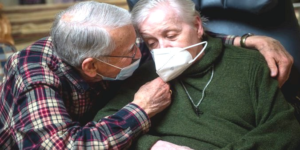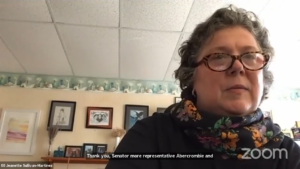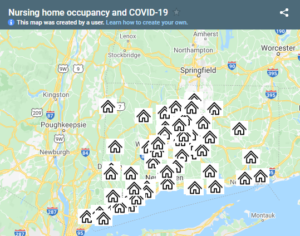Category: Medicare
Complaints About Gaps in Medicare Advantage Networks Are Common. Federal Enforcement Is Rare.
By
Along with the occasional aches and pains, growing older can bring surprise setbacks and serious diseases. Longtime relationships with doctors people trust often make even bad news more tolerable. Losing that support — especially during a health crisis — can be terrifying. That’s why little-known federal requirements are supposed to protect people with privately run Medicare Advantage coverage when contract disputes lead their health care providers and insurers to part ways.
But government documents obtained by KFF Health News show the agency overseeing Medicare Advantage does little to enforce long-standing rules intended to ensure about 35 million plan members can see doctors in the first place.
In response to a Freedom of Information Act request covering the past decade, the Centers for Medicare & Medicaid Services produced letters it sent to only five insurers from 2016 to 2022 after seven of their plans failed to meet provider network adequacy requirements — lapses that could, in some cases, harm patient care. [Continued on KFF Health News, CBS News, US News & World Report and MedpageToday.]…
When Hospitals Ditch Medicare Advantage Plans, Thousands of Members Get To Leave, Too
By
 For several years, Fred Neary had been seeing five doctors at the Baylor Scott & White Health system, whose 52 hospitals serve central and northern Texas, including Neary’s home in Dallas. But in October, his Humana Medicare Advantage plan — an alternative to government-run Medicare — warned that Baylor and the insurer were fighting over a new contract. If they couldn’t reach an agreement, he’d have to find new doctors or new health insurance.
For several years, Fred Neary had been seeing five doctors at the Baylor Scott & White Health system, whose 52 hospitals serve central and northern Texas, including Neary’s home in Dallas. But in October, his Humana Medicare Advantage plan — an alternative to government-run Medicare — warned that Baylor and the insurer were fighting over a new contract. If they couldn’t reach an agreement, he’d have to find new doctors or new health insurance.
“All my medical information is with Baylor Scott & White,” said Neary, 87, who retired from a career in financial services. His doctors are a five-minute drive from his house. “After so many years, starting over with that many new doctor relationships didn’t feel like an option.”
After several anxious weeks, Neary learned Humana and Baylor were parting ways as of this year, and he was forced to choose between the two. Because the breakup happened during the annual fall enrollment period for Medicare Advantage, he was able to pick a new Advantage plan with coverage starting Jan. 1, a day after his Humana plan ended.
 Other Advantage members who lose providers are not as lucky. Although disputes between health systems and insurers happen all the time, members are usually locked into their plans for the year and restricted to a network of providers, even if that network shrinks. Unless members qualify for what’s called a special enrollment period, switching plans or returning to traditional Medicare is allowed only at year’s end, with new coverage starting in January.
Other Advantage members who lose providers are not as lucky. Although disputes between health systems and insurers happen all the time, members are usually locked into their plans for the year and restricted to a network of providers, even if that network shrinks. Unless members qualify for what’s called a special enrollment period, switching plans or returning to traditional Medicare is allowed only at year’s end, with new coverage starting in January.![]()
But in the past 15 months, the Centers for Medicare & Medicaid Services, which oversees the Medicare Advantage program, has quietly offered roughly three-month special enrollment periods allowing thousands of Advantage members in at least 13 states to change plans. They were also allowed to leave Advantage plans entirely and choose traditional Medicare coverage without penalty, regardless of when they lost their providers. But even when CMS lets Advantage members leave a plan that lost a key provider, insurers can still enroll new members without telling them the network has shrunk.
…CMS would not identify plans whose members were allowed to disenroll after losing health providers. The agency also would not say whether the plans violated federal provider network rules intended to ensure that Medicare Advantage members have sufficient providers within certain distances and travel times. [Continued in KFF Health News, Fortune, MSN, Medpage Today, Boston Herald, Los Angeles Daily News, and Yahoo News.]
…
Can the US health-care workforce keep pace with demand?
 Volume 404, Issue 10469
Volume 404, Issue 10469
7 December 2024 
WORLD REPORT A physician and nurse shortage hinders access to care but efforts to educate, recruit, and retain more providers may be threatened. Susan Jaffe reports from Washington, DC.
The uninsured rate in the United States is at an historic low. But a shortage of health-care providers means even people who can afford to go to the doctor might not be able to find one.[Full story here, from The Lancet’s special issue, “A Presidential Briefing Book.”]…
Harris or Trump? Health in the US election
 Volume 404, Issue 10464
Volume 404, Issue 10464
2 November 2024
WORLD REPORT Aside from abortion, health issues have largely been neglected in the run-up to the Nov 5 election. What have the candidates proposed to improve health? Susan Jaffe reports.


As election day approaches on Nov 5, the US presidential race remains a tense and close competition despite unprecedented events—the Democratic candidate was replaced in August, and two attempts have been made to assassinate the Republican candidate. And despite the sharp contrast between former President Donald Trump, a Republican, and Democrat Vice President Kamala Harris, neither has so far managed to emerge as the frontrunner as The Lancet went to press. [Here‘s what the candidates say they would do on abortion, Affordable Care Act and other key health issues.]…
Medicare Drug Plans Are Getting Better Next Year. Some Will Also Cost More.
Improvements to Medicare drug coverage required by the IRA are the most sweeping changes since Congress added the benefit in 2003, but most voters don’t know about them. And some beneficiaries may be surprised by a downside: premium increases.
By
When Pam McClure learned she’d save nearly $4,000 on her prescription drugs next year, she said, “it sounded too good to be true.” She and her husband are both retired and live on a “very strict” budget in central North  Dakota.
Dakota.
By the end of this year, she will have spent almost $6,000 for her medications, including a drug to control her diabetes.
McClure, 70, is one of about 3.2 million people with Medicare prescription drug insurance whose out-of-pocket medication costs will be capped at $2,000 in 2025 thanks to the Biden administration’s 2022 Inflation Reduction Act….
“It’s wonderful — oh my gosh. We would actually be able to live,’’ McClure said. “I might be able to afford fresh fruit in the wintertime.” [Continued in KFF Health News, CBS NEWS, Los Angeles Times, and The Atlanta Journal-Constitution.]
…Why aren’t the Republicans talking about health?
 Volume 403, Issue 10450
Volume 403, Issue 10450
27 July 2024
WORLD REPORT Health-care issues were conspicuously absent from the 4-day party convention culminating in Donald Trump’s nomination as the Republican 2024 presidential candidate. Susan Jaffe reports.
Former US President Donald Trump spent 93 minutes accepting the Republican Party’s nomination for president last week, exceeding his own 2016 record for the longest acceptance speech at a political convention. But there was no time to mention major health-care issues such as abortion, the COVID-19 pandemic, medical research funding, the Affordable Care Act (ACA), or the opioid epidemic, to name a few. Yet domestic and global healthcare spending consume the largest part of the US budget. [Continued here.]…
Biden Plan to Save Medicare Patients Money on Drugs Risks Empty Shelves, Pharmacists Say
-

From left, pharmacists Brent Talley of North Carolina, Scott Pace of Arkansas, and Clint Hopkins of California. (ELIZABETH TALLEY; KORI GORDON; JOEL HOCKMAN)
By Susan Jaffe | KFF Health News | June 11, 2024
US pharmaceutical companies sue to halt cuts in drug prices
 Volume 402, Issue 10399
Volume 402, Issue 10399
29 July 2023
WORLD REPORT Medicare will soon be able to negotiate some drug prices to reduce costs for patients and taxpayers. Susan Jaffe reports from Washington, DC.
The first set of ten drugs subject to price negotiations by the US Medicare programme will be unveiled on Sept 1, 2023, but some pharmaceutical companies and their allies are not waiting to find out which products will be on the list. So far, four manufacturers and two trade associations are suing to stop the process before it begins. [Continued here.]
…
A Covid Test Medicare Scam May Be a Trial Run for Further Fraud
By ,
Medicare coverage for at-home covid-19 tests ended last week, but the scams spawned by the temporary pandemic benefit![]() could have lingering consequences for seniors.
could have lingering consequences for seniors.
Medicare advocates around the country who track fraud noticed an eleventh-hour rise in complaints from beneficiaries who received tests — sometimes by the dozen — that they never requested![]() . It’s a signal that someone may have been using, and could continue to use, seniors’ Medicare information to improperly bill the federal government. …One beneficiary in Indiana suspected something was amiss after receiving 32 unrequested tests over a 10-day period. [Continued on Kaiser Health News, NPR, Yahoo News, and St. Louis Post-Dispatch]…
. It’s a signal that someone may have been using, and could continue to use, seniors’ Medicare information to improperly bill the federal government. …One beneficiary in Indiana suspected something was amiss after receiving 32 unrequested tests over a 10-day period. [Continued on Kaiser Health News, NPR, Yahoo News, and St. Louis Post-Dispatch]…
Medicare considers expanding dental benefits for certain medical conditions
Proposed changes in Medicare rules could soon pave the way for a significant expansion in Medicare-covered dental services, while falling short of the comprehensive benefits that many Democratic lawmakers have advocated.
That’s because, under current law, Medicare can pay for limited dental care only if it is medically necessary to safely treat another covered medical condition. In July, officials proposed adding conditions that qualify and sought public comment. Any changes could be announced in November and take effect as soon as January. The review by the Centers for Medicare & Medicaid Services follows an unsuccessful effort by congressional Democrats to pass comprehensive Medicare dental coverage for all beneficiaries, a move that would require changes in federal law. As defeat appeared imminent, consumer and seniors’ advocacy groups along with dozens of lawmakers urged CMS to take independent action. [Continued on Kaiser Health News and CNN]
…Medicare Surprise: Drug Plan Prices Touted During Open Enrollment Can Rise Within a Month
By Susan Jaffe | Kaiser Health News | May 3, 2022 | This KHN story also ran on 
… Seeking to Shift Costs to Medicare, More Employers Move Retirees to Advantage Plans
By Susan Jaffe | Kaiser Health News | March 3, 2022 | This KHN story also ran in Fortune and The Dallas Morning News.
…Medicare’s Open Enrollment Is Open Season for Scammers
By Susan Jaffe | Kaiser Health News | November 11, 2021 | This KHN story also ran in The Washington Post.

In response, the Centers for Medicare and Medicaid Services has threatened to penalize private insurance companies selling Medicare Advantage and drug plans if they or agents working on their behalf mislead consumers. The agency has also revised rules making it easier for beneficiaries to escape plans they didn’t sign up for or enrolled in only to discover promised benefits didn’t exist or they couldn’t see their providers.
The problems are especially prevalent during Medicare’s open-enrollment period, which began Oct. 15 and runs through Dec. 7. A common trap begins with a phone call like the one Linda Heimer, an Iowa resident, received in October. [Full story in The Washington Post and Kaiser Health News.]
3 States Limit Nursing Home Profits in Bid to Improve Care
“If they choose to rely on public dollars to deliver care, they take on a greater responsibility,” says New York Assemblyman Ron Kim. “It’s not like running a hotel.”
By Susan Jaffe | KAISER HEALTH NEWS | October 25, 2021 | This story also ran on
Nursing homes receive billions of taxpayers’ dollars every year to care for chronically ill frail elders, but until now, there was no guarantee that’s how the money would be spent.
Massachusetts, New Jersey and New York are taking unprecedented steps to ensure they get what they pay for, ![]() after the devastating impact of covid-19 exposed problems with staffing and infection control in nursing homes. The states have set requirements for how much nursing homes
after the devastating impact of covid-19 exposed problems with staffing and infection control in nursing homes. The states have set requirements for how much nursing homes  must spend on residents’ direct care and imposed limits on what they can spend elsewhere, including administrative expenses, executive salaries and advertising and even how much they can pocket as profit. …With this strategy, advocates believe, residents won’t be shortchanged on care, and violations of federal quality standards should decrease because money will be required to be spent on residents’ needs. At least that’s the theory. [Continued on Kaiser Health News, Fortune, NBC News, Yahoo Finance, and Chicago Sun-Times]…
must spend on residents’ direct care and imposed limits on what they can spend elsewhere, including administrative expenses, executive salaries and advertising and even how much they can pocket as profit. …With this strategy, advocates believe, residents won’t be shortchanged on care, and violations of federal quality standards should decrease because money will be required to be spent on residents’ needs. At least that’s the theory. [Continued on Kaiser Health News, Fortune, NBC News, Yahoo Finance, and Chicago Sun-Times]…
The Push For Nursing Home Reform In The Middle Of A Pandemic
 Sept. 20, 2021 | Today on NPR‘s news program “1A,” reporter Susan Jaffe discusses her Kaiser Health News story about new state laws protecting nursing home residents in response to the COVID-19 pandemic. Changes affect staffing, visitation rights, virtual communications, “essential support persons,” and more. A resident of a Connecticut nursing home quoted in this KHN article is also a guest. …
Sept. 20, 2021 | Today on NPR‘s news program “1A,” reporter Susan Jaffe discusses her Kaiser Health News story about new state laws protecting nursing home residents in response to the COVID-19 pandemic. Changes affect staffing, visitation rights, virtual communications, “essential support persons,” and more. A resident of a Connecticut nursing home quoted in this KHN article is also a guest. …
After pandemic ravaged nursing homes, new state laws protect residents
So far, 23 states have passed more than 70 new pandemic-related provisions affecting nursing home operations.
By Susan Jaffe | KAISER HEALTH NEWS | August 17, 2021 | This story also ran in![]()
When the coronavirus hit Martha Leland’s Connecticut nursing home last year, she and dozens of other residents contracted the disease while the facility was on lockdown. Twenty-eight residents died, including her roommate.
“The impact of not having friends and family come in and see us for a year was totally devastating,” she said. “And then, the staff all bound up with the masks and the shields on, that too was very difficult to accept.” She summed up the experience in one word: “scary.”
But under a law Connecticut enacted in June, nursing home residents will be able to designate an “essential support person” who can help

take care of a loved one even during a public health emergency. Connecticut legislators also approved laws this year giving nursing home residents free internet access and digital devices for virtual visits and allowing video cameras in their rooms so family or friends can monitor their care.
Similar benefits are not required by the Centers for Medicare & Medicaid Services, the federal agency that oversees nursing homes and pays for most of the care they provide. But states can impose additional requirements when those federal rules are insufficient or don’t exist. And that’s exactly what many are doing, spurred by the virus that hit the frail elderly hardest. [Continued at Kaiser Health News and USA Today]
…
Chiquita Brooks-LaSure: innovative US federal health director
 Volume 398, Issue 10300
Volume 398, Issue 10300
14 August 2021
PROFILE 
Chiquita Brooks-LaSure, President Joe Biden’s choice to lead the Centers for Medicare and Medicaid Services, presides over an agency with a US$1 trillion budget that provides health insurance to more than 154 million people. Tackling health-care inequities is one of her top priorities. “These disparities have long existed, but COVID-19 has illuminated them in a way that is really unprecedented”, she said. [Full story here.]
…
Zooming Into the Statehouse: Nursing Home Residents Use New Digital Skills to Push for Changes
By Susan Jaffe | Kaiser Health News | June 9, 2021 | This KHN story also ran on![]() and
and
Patty Bausch isn’t a Medicaid expert, lawyer or medical professional. But she still thinks Connecticut legislators need her input when they consider bills affecting people like her — the roughly 18,000 residents who live in the state’s nursing homes.
With help and encouragement from Connecticut’s Long Term Care Ombudsman Program, Bausch signed up and testified remotely before a legislative hearing this year. Nursing home residents who have been using digital technology to reach out to family and friends — after the covid pandemic led officials to end visitation last year — could also use it to connect with elected officials once the legislature moved to remote hearings. Speaking into an iPad provided by the ombudsman’s office, Bausch testified without ever leaving her room at the Newtown Rehabilitation & Health Care Center, where she has lived since having a stroke three years ago. The combination of a virtual legislature and nursing home residents equipped with internet access has created an opportunity most nursing home residents rarely have — to participate in their government up close and in real time. [Continued on Kaiser Health News, Next Avenue and Connecticut Public Radio.]…
Under New Cost-Cutting Medicare Rule, Same Surgery, Same Place, Different Bill
By Susan Jaffe | Kaiser Health News | March 21, 2021 | This KHN story also ran in The Washington Post
For years, Medicare officials considered some su rgeries so risky for older adults that that the insurance program would cover the procedures only for patients admitted to the hospital. Under a new Medicare policy that took effect this year, these operations can be provided to patients who are not admitted. But patients still have to go to the hospital. The change saves Medicare money while patients can pay a larger share of the bill — for the same surgery at the same hospital. [Full story in The Washington Post and Kaiser Health News.]
rgeries so risky for older adults that that the insurance program would cover the procedures only for patients admitted to the hospital. Under a new Medicare policy that took effect this year, these operations can be provided to patients who are not admitted. But patients still have to go to the hospital. The change saves Medicare money while patients can pay a larger share of the bill — for the same surgery at the same hospital. [Full story in The Washington Post and Kaiser Health News.]
… Biden unwinds Trump health-care policies
Volume 397, Issue 10272
30 January 2021
WORLD REPORT A Democrat in the White House and a Democratic Congress could bring big changes to US health policy, but challenges remain. Susan Jaffe reports from Washington, DC.
…Before the Biden Administration can tackle other health priorities, the first order of business is the fight against the COVID-19 pandemic, which has killed more than 420 000 Americans—a death toll higher than that of any other nation—and has exposed health-care inequities and crippled the economy. …Although Biden will have a lot of support for his health-care agenda, “that doesn’t mean that it’s smooth sailing”, said Lanhee Chen, a public policy fellow at the Stanford University’s Hoover Institution. “I think there are still a lot of people who are very upset about the outcome of the election.” [Full story here.]…
US Supreme Court poised to keep the Affordable Care Act
Volume 396, Issue 10263
21 November 2020
WORLD REPORT A lawsuit to overturn the Affordable Care Act may be floundering after Supreme Court justices questioned why the law should be dismantled. Susan Jaffe reports from Washington, DC.
The fate of the Affordable Care Act (ACA) is again in the hands of the US Supreme Court, after close calls in lawsuits in 2012 and 2015. But last week’s hearing was different: justices who once voted to overturn the law— along with President Donald Trump’s recent court appointees—bombarded opponents with sceptical questions.
After oral arguments in the case, known as California v. Texas, legal experts believe President Barack Obama’s signature health reform law is not in mortal danger. [Continued here.]
…US election 2020: the future of the Affordable Care Act
Volume 396, Number 10260 31 October 2020
WORLD REPORT President Donald Trump pledges to replace the Affordable Care Act while his Democratic opponent Joe Biden offers detailed proposals to improve it. Susan Jaffe reports from Washington, DC.
Since winning the presidency in 2016 in large part by promising to eliminate Obamacare, otherwise known as the Affordable Care Act (ACA), Donald Trump has promised more than a dozen times that his replacement plan would be ready soon. The plan would be released in 2 weeks, a White House spokeswoman said 2 months ago.

“We’re going to have a health-care plan that will be second to none”, Trump said in 2017. “It’s going to be great and the people will see that.” And at last week’s final presidential debate, he vowed “to terminate Obamacare, [and] come up with a brand new beautiful health care”.
A decade after the ACA—President Barack Obama’s signature achievement—became law, repealing and replacing Obamacare is again central to Trump’s re-election. And improving and expanding the law is a crucial part of the campaign of his challenger, former Vice President Joe Biden. [Continued here.]
…Pandemic Deals Another Blow To Nursing Homes: Plummeting Occupancy
BY SUSAN JAFFE | CONNECTICUT HEALTH INVESTIGATIVE TEAM | SEPTEMBER 16, 2020 
While the deadly coronavirus seems to be subsiding in Connecticut for now, its impact on nursing homes has not. More than 6,700 beds are empty, and it may take many months of financial struggle before occupancy climbs back to pre-pandemic levels.
Of the approximately 200 nursing homes in Connecticut that receive payments from Medicaid, the government health insurance program for low-income people, only 15 were
70% or less occupied in January, according to the Connecticut Health Investigative Team’s analysis of state data. By August, almost five times as many facilities saw occupancy drop to that level or less….
Owners say the state and federal governments aren’t doing enough to shore up their industry and protect residents during the pandemic. And in some cases, policies intended to control the virus can make things worse. [Continued here, with map and table of dangerously low occupancy nursing homes.]…
CMS Warns of COVID-19 Spike in Nursing Homes
Medicare chief says “significant deficiencies in infection control practices” in nursing homes have doubled weekly COVID-19 cases, but “this isn’t a time of fines and being punitive.”






 In the early spring, the number of virus cases in nursing homes was about 11,000 a week, which dropped to 6,319 cases by the end of June, CMS Aministrator Seema Verma
In the early spring, the number of virus cases in nursing homes was about 11,000 a week, which dropped to 6,319 cases by the end of June, CMS Aministrator Seema Verma